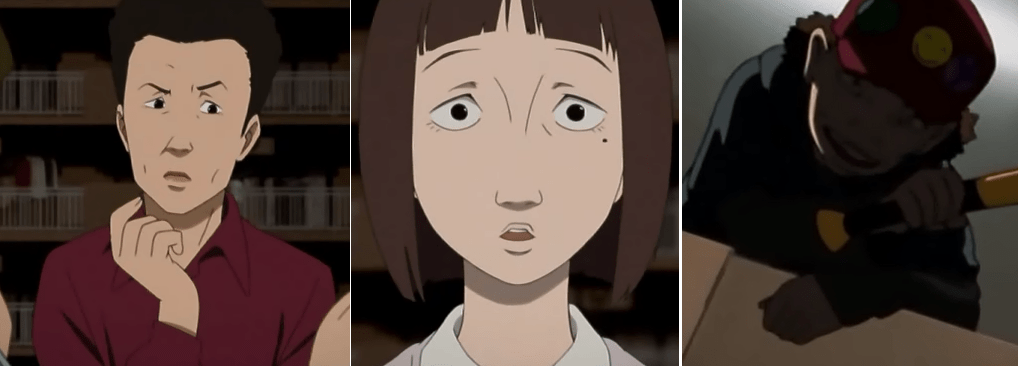Among our cavalcade of deliciously delirious mass hysteria victims, we’ve once again got ourselves an episode that’s plot divergent but none the less intriguing—an anthology episode, with a bunch of stories framed by the whisperings of four bored gossiping housewives as a new neighbor (married to a screenwriter), eager to join the flock, learns about the strange goings-on with Lil’ Slugger.
This means that, unlike our last trio, there’s little to no characterization of … anyone, really, with the episode opting instead to present how internalized perceptions of Lil’ Slugger manifest throughout different facets of society. Personally, I think the episode works as not only one of the most direct social commentaries throughout the entire series, but also as something that really starts to define and give form to Lil’ Slugger as the social phenomenon that he is.
Now, I kind of want to get to my own personal interpretation of each story and how they relate to each other, so I’m going to opt out of going into excessive detail on the individual imagery of each story (even though it’s all really standout and unique. Honestly, you can go on and on about this stuff, but you know the show by now). The stories told by the women play out like this:
Story one starts with our gaggle of gals making some presumptions about a failing student that happens to live in their apartment complex, whispering about his striking out during exams and eventual suicide. His head too stuffed with valuable info, words (And facts. And equations.) come literally spewing out of his mouth as he desperately tries (and fails) to keep himself together, ending with death via left-field swing. The story itself works well as a personified manifestation of student fears. It seems to articulate the most popular interpretation of what the social phenomenon is (something that is called specifically when someone is cornered, no matter the context) and tells you that these women perceive Lil’ Slugger as an agent of himself, primarily.
Interestingly enough, they seem to have a superficial sympathy for the student but don’t seem to try to grasp any sort of understanding for batboy. One thing of note here is how Slugger’s face is markedly more defined in this instance then in the real world, suggesting that there’s a defined form that takes place in “society’s eye” that’s separate from what’s really going on.
Story two is about a housewife made miserable by constant henpecking from the archetypal overbearing mother-in-law. In addition to the “bad-guy” getting her just deserts, Lil’ Slugger functions as a justice provider, making life easier for the impoverished. What he’s not in this story, however, is all-powerful and omnipotent, as apparently he’s made a mistake in this one by targeting the mother-in-law instead of the cornered one.
The third one works as a good old fashioned horror story, weaving the tale of a genetically different baby gestating in a lady due to the doctor’s screw up during the process of in vitro fertilization that gave mama both different egg and sperm cells. It’s a classic parasite/pregnancy story, articulating a pervading fear of factors out of human control.
Another features star-crossed lovers trying to make the most of their time together as the woman contends with a terminal illness. It’s also a statement on how the Lil’ slugger mythos serves as a narrative that engages people. Stories also start becoming slightly more incomprehensible from here on out.
A rookie baseball player gets his cleats in a twist when he’s giving conflicting directions by his team, and looks to Slugger for some guidance.
A former boxer meets his delicious downfall as Lil’ Slugger lays out platters of sushi and cakes for his especial temptation, as a bringer of lazy temptation to escape your problems.
One mob boss uses golden boy to help him out of a pickle. He suddenly becomes something that can be utilized by the powerful.
An emaciated, shipwrecked castaway calls Slugger in desperate starvation.
A team of rocket scientist call him when a major disaster leaves a rocket ship destroyed upon launch and erases months of work.
Etc, etc.
And now, ehehe, we really get back to our frame story, and things start to come full circle. One thing that should be noted at this point is that whenever newbie housewife tries to insert her own stories into the bunch (the baby one and island one, most notably) the veteran hens start bitching about how it doesn’t relate to them. Newbie walks home, only to find that her husband has been attacked by Lil’ Slugger, and we’re left to be shocked by her immediate anxiety in needing to know just how he got attacked so that she can tell her triad all about it.
Finally, our stories are tied off in a tale on how mythos is created for self validation and external approval. It’s a macabre, if an effective device and metaphor, and happens to be another one of my favorite episodes.
Handy Dandy Things to Think About:
*Which projection of this mass hysteria do you think rings the most accurate based on what the show’s setting up?
*What’s more real? The Slugger we’ve seen so far, or what’s projected by these women?
Rachael’s a student at a Florida university that frolics regularly in Disney parks and has an entirely too extensive collection of stuffed animals. If you wanna follow her other random musings on cartoons (or just stop by to say hi) there’s her blog https://lotsofframes.wordpress.com/.
—Please make note of The Mary Sue’s general comment policy.—
Do you follow The Mary Sue on Twitter, Facebook, Tumblr, Pinterest, & Google +?









Published: Nov 12, 2015 08:00 pm